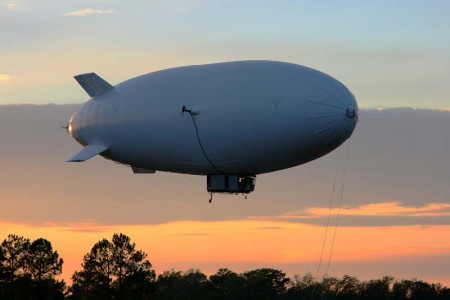What do I think of mercenaries working for the U.S.A.?
The Roman Empire gradually entrusted the role of defending the Empire to mercenaries.
The Roman Empire is history.
_______________________________________________________________________________________
Blackwater expands its fleet of airships
Saturday Jul 19, 2008, Source: AirForceTimes

Blackwater Worldwide is building up its own Air Force.
Airmen might soon find Blackwater blimps patrolling Iraq and Afghanistan skies in addition to its helicopter and light transport aircraft already flying thousands of missions in theater.
According to Blackwater Worldwide CEO Erik Prince, eight Blackwater CASA 212 light transport aircraft flew 11,000 sorties in Afghanistan last year supporting 38 combat outposts over 19,000 square miles. Its aircraft transported more than 40,000 personnel and 9.5 million pounds of supplies last year.
“We moved about 40,000 passengers, and our total costs, our total invoice for that mission is about what the U.S. Air Force is paying for one new C-27,” he said.
“So the idea of outsourcing versus having government do it, that’s a pretty simple math question for me.”
…and for other contractors. Halliburton is charging $45 for a six-pack of Coca-Cola when it feeds our troops. International laws covering war crimes did not apply to such private contractors like Blackwater.
Blackwater, America’s Private Army
Source: YouTube
Recommended documentary: Iraq for Sale
Prince, who sat down July 7 for a rare, exclusive interview with Military Times editors and reporters, said he isn’t looking to replace the Air Force – simply fill a void where his company is needed.
“I think there’s a gap,” Prince said. “The C-130 is a great aircraft, but the older ones are getting pretty worn out and the C-130Js are coming online, but that’s a very expensive airplane.”
While he doesn’t want to replace it, Prince did equate his company’s aviation arm to a National Guard or reserve unit working under the operational control of joint forces. Blackwater missions are part of the daily Air Tasking Order just like any Air Force mission, he said.
Prince’s aviation dealings don’t even fall under the Blackwater name, instead aligning his fixed wing and helicopter fleet under Presidential Airways, which he bought in 2003. That company earned $28.6 million in fiscal 2007 Defense Department contracts.
As Africa Command stands up this fall, Prince said he foresees the potential for an even greater need there for his company’s aviation services.
“I think there’s less road now than there was 40 years ago in Africa,” he said. “So, being able to fly around is pretty key and being able to fly into rough places.”
Setting up Africa Command has been pretty sensitive, evidenced by the Defense Department’s inability to find an African country willing to host the new headquarters, so connecting Blackwater and its controversial reputation could add to the anxieties.
Both of Prince’s companies have become the focus of lawsuits, investigations and criticism from U.S. and Iraqi lawmakers as well as military leaders and troops on the ground.
Many troops have questioned the tactics of Blackwater’s private security contractors, calling them “cowboys.” The FBI continues to investigate a September 2007 Baghdad shootout involving Blackwater contractors that left 17 Iraqi civilians dead.
Presidential Airways came under fire in November 2004 when one of its Spanish-made CASA 212s carrying three soldiers slammed into an Afghanistan box canyon, killing all aboard, including the contracted pilot, co-pilot and maintainer.
Army Spc. Harley Miller survived the crash but froze to death after authorities didn’t realize the plane went down for six hours, according to a report by the National Transportation Safety Board. The report faulted the pilots.
“The flight crewmembers … chose to fly a nonstandard route through a valley, they used a global positioning system to navigate, and they deliberately flew the airplane at low altitude through the valley for ‘fun,’ ” the report read.
Presidential Airways kept its contract and eight of at least 10 CASAs Presidential Airways aircraft operate out of Bagram Air Base, Afghanistan, Prince said.
The eight CASAs and crews average almost four sorties a day flying personnel and supplies to the far reaches of Afghanistan, Blackwater officials said.
Four contractors – a pilot, copilot, loadmaster and crew chief – operate each CASA 212 parked on the side of the ramp without protection from a hangar. And Presidential Airways maintainers work out of five shipping containers.
“Our footprint and our cost to the taxpayer is mighty low,” Prince said.
By Michael Hoffman – Staff writer